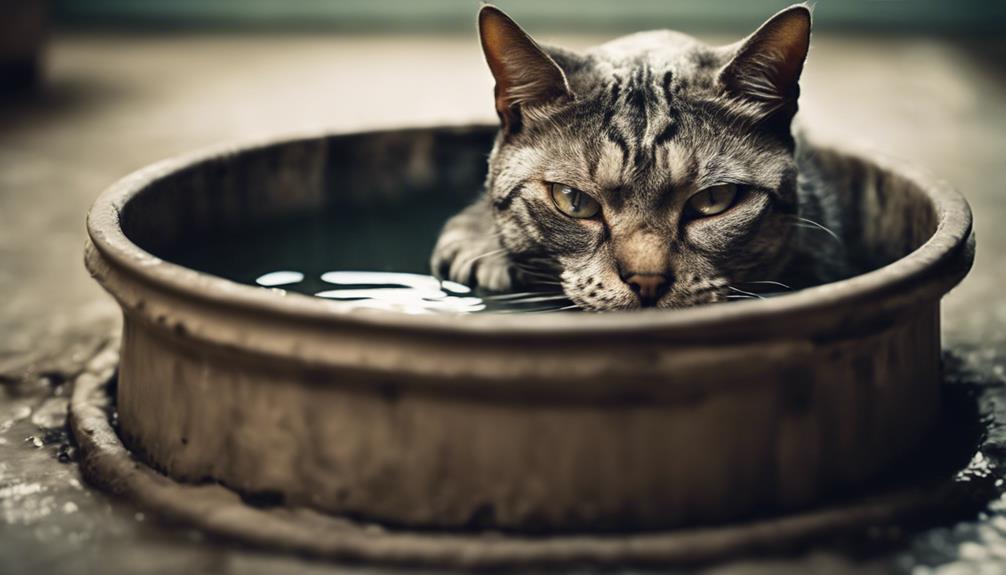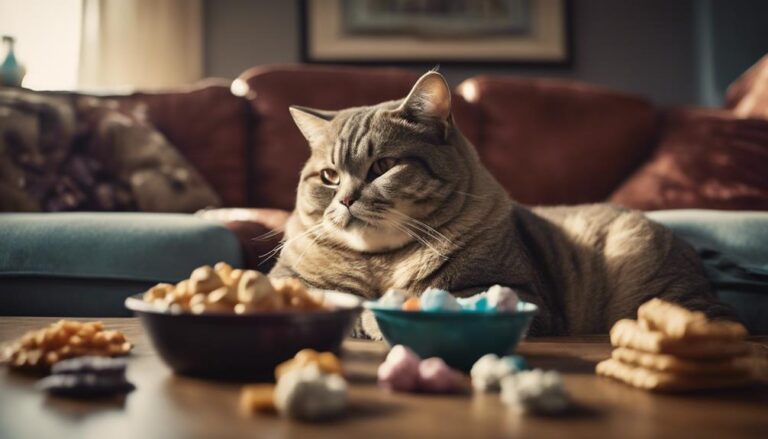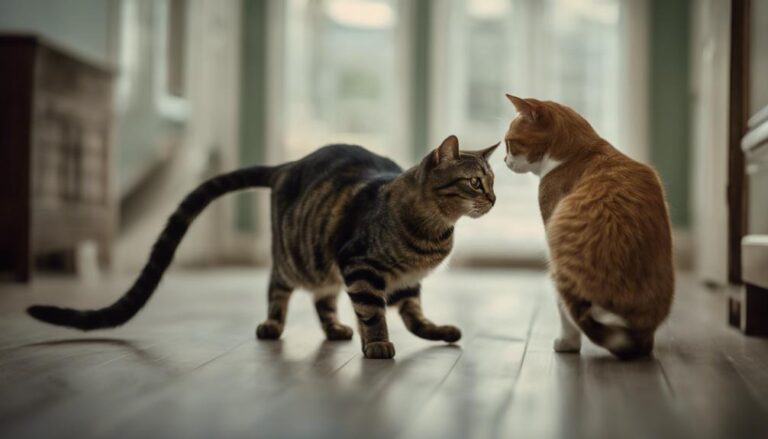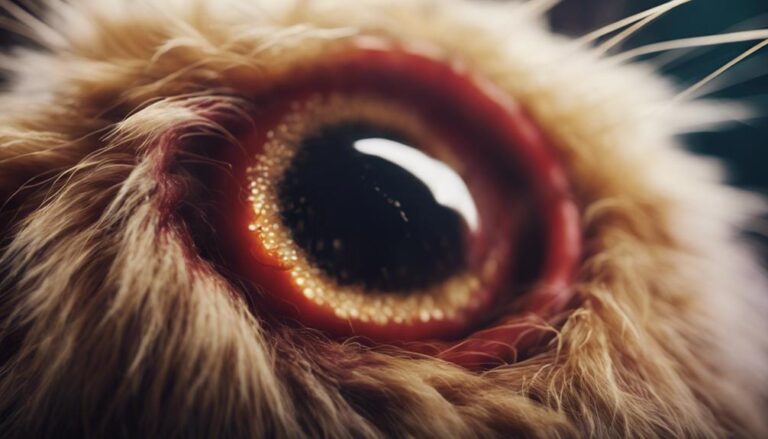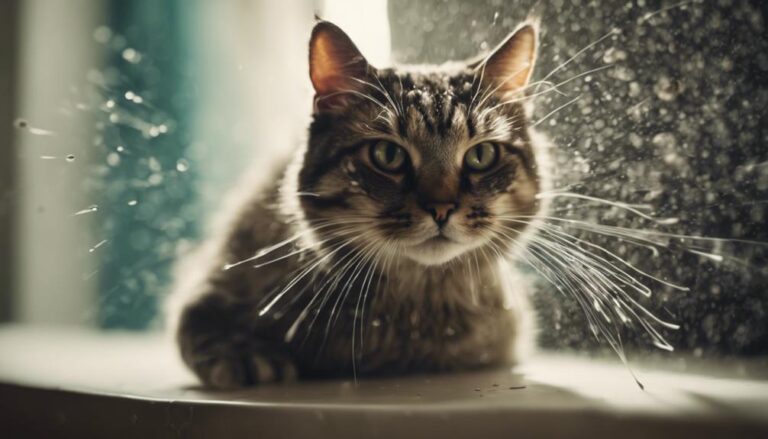As a responsible cat owner, recognizing warning signs of dehydration in your feline companion is crucial for their health. Lethargy, weakness, and dry mucous membranes can be early indicators, but have you considered the significance of physical cues like tacky gums and loss of skin elasticity? Stay tuned to discover the behavioral clues and severe signs that could signal a critical state of dehydration in your cat. Understanding these signs is vital in ensuring your cat's well-being and knowing when prompt veterinary intervention is necessary.
General Symptoms of Dehydration in Cats
If your cat is experiencing dehydration, you may notice general symptoms such as lethargy, weakness, and poor appetite. Dehydration in cats occurs when there's a lack of sufficient fluid in the body, leading to these initial warning signs.
As dehydration progresses, more severe symptoms may manifest, indicating a more critical condition. Dry mucous membranes and sunken eyes are common indicators of dehydration in cats that require immediate attention.
In some cases, if left untreated, dehydration can worsen, resulting in severe complications. Severe dehydration in cats can lead to collapse and further health issues, putting your feline companion at risk.
It's crucial to monitor your cat's hydration levels closely and take prompt action if you suspect dehydration. Seeking veterinary care is essential to address dehydration effectively and prevent any serious consequences that may arise from prolonged lack of fluids in your cat's system.
Physical Indicators of Dehydration in Cats
Moving on from recognizing general symptoms of dehydration in cats, you can easily identify physical indicators that signal dehydration in your feline companion.
Sunken eyes in cats can indicate severe dehydration and require immediate attention. Check for tacky or sticky gums in cats, as this can be a sign of dehydration. Loss of skin elasticity in cats, indicated by a delayed return of a skin flap, can suggest dehydration. Paleness of gums and tongue in cats compared to normal color may also signal dehydration. Additionally, weakness and lethargy in cats, especially when accompanied by other symptoms, can be signs of dehydration.
Paying attention to these physical signs can help you detect dehydration in your cat early on, allowing for prompt intervention and treatment to ensure your pet's well-being. It's essential to consult your veterinarian if you notice any of these signs of dehydration in your cat.
Behavioral Clues of Dehydration in Cats
Lethargy and decreased energy levels are common behavioral clues that may indicate dehydration in your cat. When your cat is dehydrated, you may notice a lack of interest in activities they usually enjoy, such as playing or exploring.
Additionally, dehydration in your cat may manifest as a decreased appetite or being uninterested in food. If you observe your cat refusing meals or showing a sudden disinterest in eating, it could be a sign that their body is experiencing dehydration.
It's important to pay attention to changes in your cat's behavior, as their body language can provide valuable insights into their health. Cats rely on their caregivers to notice when something is amiss, and being observant of behavioral clues can help you address potential dehydration in your cat promptly.
Severe Signs of Dehydration in Cats
If your cat's eyes appear sunken, it could be a sign of severe dehydration that needs immediate veterinary attention.
Glossy eyes alongside sunken eyes may indicate a cat that's unwell and requires hydration.
Cats with sunken eyes may be in a critical state due to dehydration, necessitating urgent care.
Critical Dehydration Symptoms
When observing your cat, be alert for critical dehydration symptoms that may include sunken eyes and sticky gums, indicating the need for immediate veterinary attention.
Sunken eyes in cats can signal severe dehydration, requiring prompt intervention. If glossy eyes accompany sunken eyes, it could suggest a sick cat in urgent need of care.
Sticky gums are another severe sign of dehydration in cats, and it's crucial to compare them to a normal gum condition. Regularly monitor your cat's gum health for any tackiness or stickiness, as this can help in detecting dehydration early on.
Immediate Veterinary Attention
For cats experiencing severe dehydration, immediate veterinary attention is crucial to address their condition effectively. Signs such as sunken eyes and sticky gums indicate a serious issue that requires prompt intervention.
Sunken eyes in cats are a clear indicator of dehydration and shouldn't be taken lightly. If your cat's eyes appear glossy or sunken, it's vital to seek veterinary care promptly.
Similarly, sticky gums in cats are another concerning symptom of dehydration that necessitates urgent veterinary evaluation. Monitoring your cat's gum health for any tackiness can help you detect dehydration early on.
Cats displaying severe signs of dehydration, including sunken eyes and sticky gums, should be seen by a vet without delay to address potential underlying health issues.
Monitoring Dehydration in Senior Cats
To effectively monitor dehydration in senior cats, regularly observe for signs such as sunken eyes and dry gums. Senior cats are more susceptible to dehydration due to age-related changes in their bodies. Factors like decreased kidney function can impact their water retention abilities, while a diminished sense of thirst may lead to reduced water intake.
Since senior cats may not always show obvious signs of dehydration, it's essential to pay close attention to subtle cues like lethargy, loss of appetite, and decreased skin elasticity. Monitoring your senior cat's water consumption and litter box habits can also provide valuable insights into their hydration status.
Regular veterinary check-ups are crucial for senior cats to help detect dehydration early on and prevent any potential complications. By staying vigilant and proactive in observing your senior cat's behavior and physical condition, you can better ensure their overall health and well-being.
Preventive Measures Against Dehydration
Implementing proactive measures to prevent dehydration in your cat is crucial for maintaining their health and well-being. To ensure your cat stays hydrated, provide fresh water in easily accessible locations to encourage regular drinking habits.
Consider using water fountains to entice cats to drink more water throughout the day. Increasing moisture intake can be done by adding water to dry food or offering wet food. You can also make water more appealing by flavoring it with tuna water or low-sodium chicken broth.
It's essential to address any territorial conflicts among cats over water bowls to ensure all cats have access to hydration sources. By taking these preventive measures, you can help prevent dehydration in your cat and promote their overall health.
Frequently Asked Questions
How Do Cats Act When They Are Dehydrated?
When you notice your cat is dehydrated, they may act lethargic, have dry gums, sunken eyes, lose their appetite, energy, and may even pant. Keep an eye out for these signs to ensure their well-being.
How Do You Check a Cat for Dehydration?
To check a cat for dehydration, gently pull up their skin to see if it quickly returns, look at their gums for moisture and pink color, monitor their energy levels, observe their drinking habits, and watch for sunken eyes.
How Do You Rehydrate a Cat?
To rehydrate a cat, encourage drinking with tasty fluids like chicken broth or tuna water mixed with water. Opt for wet food for added moisture. Try using ice cubes in the bowl to entice drinking. Monitor closely and consult a vet for tailored advice.
How Long Does It Take for a Cat to Become Dehydrated?
You can notice signs of dehydration in your cat within 12-24 hours of inadequate water intake. Factors like vomiting, diarrhea, or excessive urination can speed up dehydration. Promptly recognizing and treating dehydration is crucial to prevent complications.

